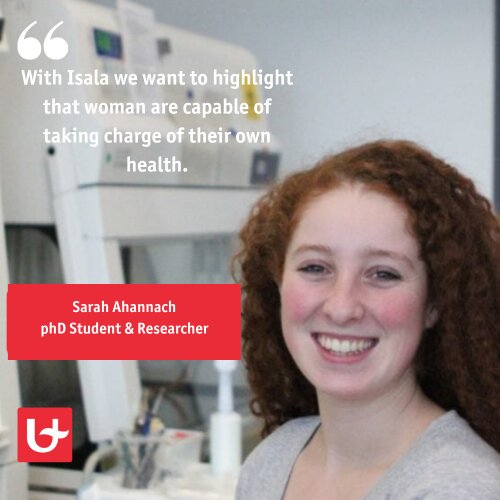
Sarah Ahannach, researcher at Isala, is participating in research into the female microbiome in Flanders within the citizen science project 'Isala'. Isala is a thriving project named after a strong woman: 'Isala Van Diest'; the very first female doctor in Belgium to write history in this way. Together with Isala, the University of Antwerp wants to break the taboo about vaginal health. Each participant was asked to take a number of simple 'swabs' from their vagina, skin and saliva in the privacy of their own bathroom and return them afterwards. Thanks in part to the thousands of participants, Isala was the first to map the vaginal microbiome in Flanders and thus help to break through the distorted image and taboo about vaginal health. “The focus at Isala is on exploring the link with your lifestyle and environmental factors and how these can affect your female microbiome.”
Unexpected success
“When Isala started up, it was very difficult to find sponsorship/financial support, the impact of our research was clearly underestimated because we received a huge response in record time. For us it immediately became clear that women were really waiting for a project like Isala. Originally we wanted to reach 200 participants for our research, but this quickly became a lot more and we had to constantly reinvent ourselves to keep up with all this research data. From all the results, we were able to draw up eight profiles in which the participants were classified on the basis of which bacteria dominated in the vagina at that moment. In this way, the participants themselves also learned a lot about their vagina.”
Taboo breaking
“About 73% of women have already worried about their vaginal health, but unfortunately there is still too much taboo around this topic, something we want to change with Isala. The female microbiome is something dynamic that you can influence as a woman, because it changes continuously through small adjustments such as a new bed partner, new lifestyle or even new underwear! So with Isala we want to show that women are in control of their (vaginal) health.”
Isala wants to keep growing
”Of course there is a cost involved in a study such as Isala. We have already achieved a lot of great things, but we still have at least as many plans for the future! Isala is not only research-oriented, but can also play an important role in communication to society, which is why it remains important that we are allowed to receive donations from various sources. In this way we can make Isala even more inclusive and diverse.”